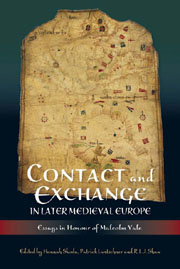Book contents
- Frontmatter
- Contents
- List of Illustrations
- List of Contributors
- Acknowledgements
- The Work of Malcolm Vale
- Principal Bibliography of Malcolm Vale
- Introduction
- Part I Boundaries and Units
- Introduction
- Economic Development, Social Space and Political Power in Bruges, c. 1127–1302
- Flemings in the Peasants' Revolt, 1381
- Does a Common Language Mean a Shared Allegiance? Language, Identity, Geography and their Links with Polities: The Cases of Gascony and Brittany
- Revisiting the Political Uses of Vernacular Language in Portugal during the Thirteenth Century: On Models, Motives and Modes
- Scotland in the Later Middle Ages: A Province or a Foreign Kingdom for the English?
- The Angevin Legacy, Dynastic Rivalry and the Aftermath of the Hundred Years War, 1453–1491
- Part II Practices of Exchange
- Conclusions
- Index
- Tabula Gratulatoria
Revisiting the Political Uses of Vernacular Language in Portugal during the Thirteenth Century: On Models, Motives and Modes
from Part I - Boundaries and Units
Published online by Cambridge University Press: 05 February 2013
- Frontmatter
- Contents
- List of Illustrations
- List of Contributors
- Acknowledgements
- The Work of Malcolm Vale
- Principal Bibliography of Malcolm Vale
- Introduction
- Part I Boundaries and Units
- Introduction
- Economic Development, Social Space and Political Power in Bruges, c. 1127–1302
- Flemings in the Peasants' Revolt, 1381
- Does a Common Language Mean a Shared Allegiance? Language, Identity, Geography and their Links with Polities: The Cases of Gascony and Brittany
- Revisiting the Political Uses of Vernacular Language in Portugal during the Thirteenth Century: On Models, Motives and Modes
- Scotland in the Later Middle Ages: A Province or a Foreign Kingdom for the English?
- The Angevin Legacy, Dynastic Rivalry and the Aftermath of the Hundred Years War, 1453–1491
- Part II Practices of Exchange
- Conclusions
- Index
- Tabula Gratulatoria
Summary
Allá van lenguas, donde quieren reyes, the subtitle of an article by Fernando Gonzaléz Ollé, provides an apposite adaptation of the old Spanish adage alla van leyes donde quieren reyes, and encapsulates language evolution and policies in medieval Iberia during the twelfth and thirteenth centuries. It was during this period that most of the Spanish kingdoms adopted Romance as their official language, the language which was to be written in the documents issued by the notaries in the royal chancery. This almost simultaneous conversion to vernacular writing was propelled by a number of factors ranging from internal processes of linguistic evolution to the influence of external notaries, but foremost among these was royal policy. This concerned not only the establishment of a new vernacular writing code, but also the adoption of the vernacular Romance language of a specific kingdom as the official language of royal chanceries.
In the late medieval Iberian Romance-speaking world, ‘vernacular behaviours’ cohabited with Latin as the official languages in which documents were written. In order for the documents to be understood by their recipients, notaries had to adapt their reading of the Latin texts to Romance pronunciation. They also incorporated considerable parts of Romance lexicon into the documents, latinising words in order to make written acts intelligible to all concerned. The linguistic situation was complex: the frontier between vernacular speech and written Latin was thin and permeable, and the complexities of the historical process added more specificities to the Spanish case, where as many as three written codes were already in place.
- Type
- Chapter
- Information
- Contact and Exchange in Later Medieval EuropeEssays in Honour of Malcolm Vale, pp. 103 - 126Publisher: Boydell & BrewerPrint publication year: 2012



